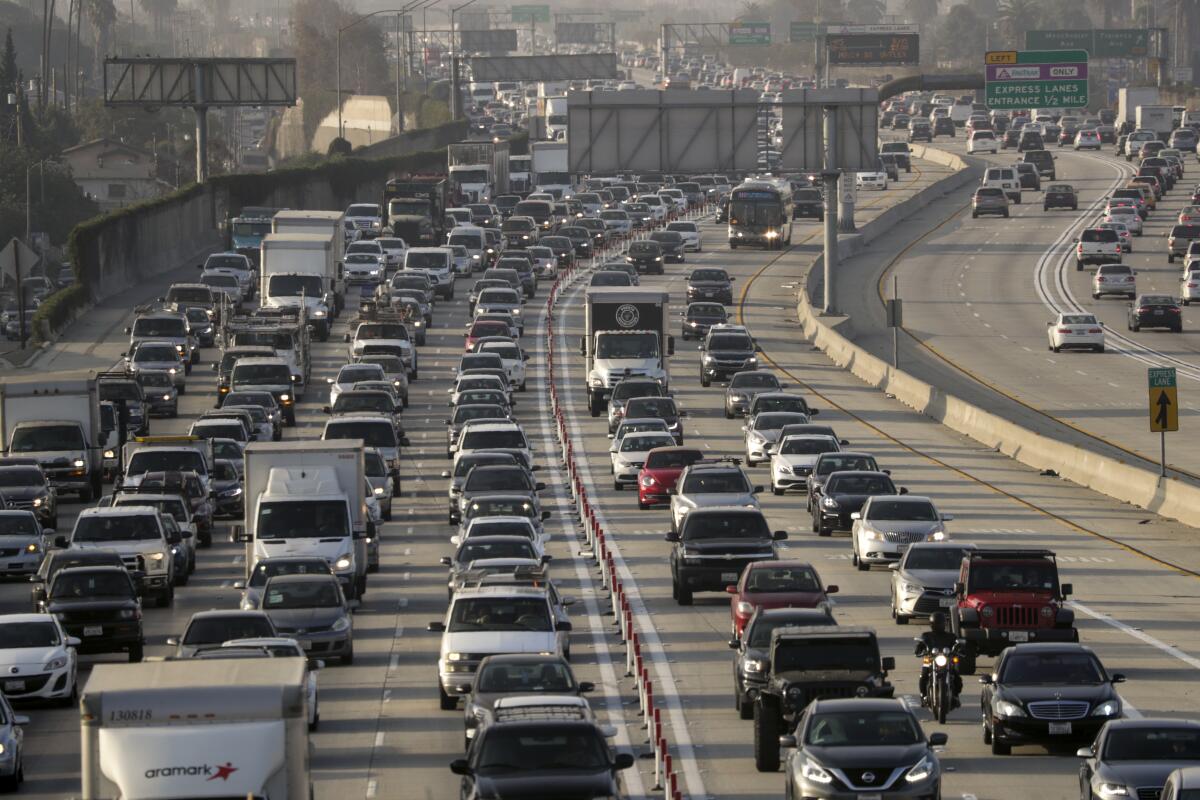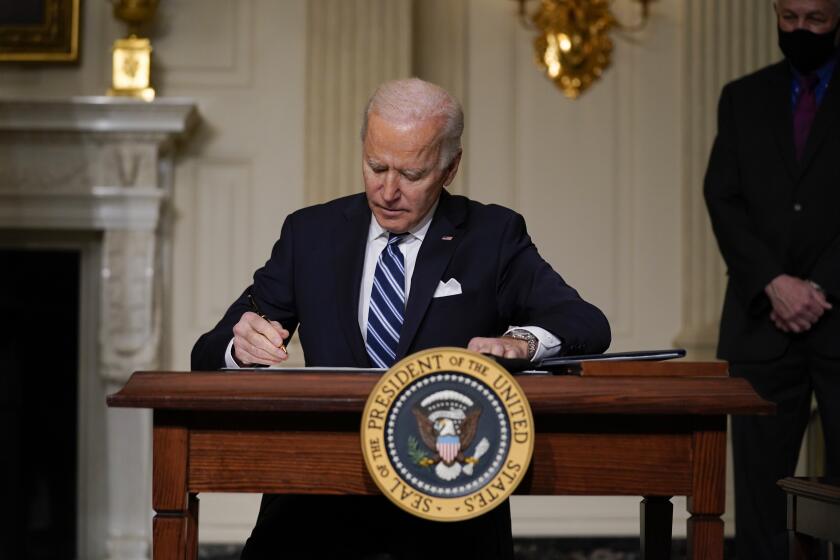Biden’s auto dilemma: How hard to push for electric cars?

- Share via
WASHINGTON — After four years of bitter fighting, California and the federal government agree they need to set ambitious climate goals, and major automakers are increasingly betting that the future of their business lies with electric cars.
But consumers aren’t there yet.
Despite growing momentum for a national shift toward cleaner cars, less than 1% of vehicles on the nation’s roads are electric. A recent analysis found that Americans were buying so many gas-guzzling SUVs and pick-up trucks that they had effectively canceled emissions reductions from every electric vehicle in the United States.
This divide between the reality of America’s auto market and what the federal government and some automakers hope it will become is certain to create dilemmas for the Biden administration as it sets out to negotiate a new set of fuel-economy standards.
“The challenge for the administration is that they’re going to be faced with the car companies saying you can’t make the overall standards too strong because the consumers aren’t there,” said John DeCicco, research professor emeritus at the University of Michigan Energy Institute. “There’s a pretty severe misalignment between the market and the regulatory need.”
President Biden announced new actions to combat climate change and take the first step toward a ban on oil leasing on federal land.
At stake is President Biden’s ability to deliver on his promise of eliminating greenhouse gas emissions by 2050 to prevent the worst effects of climate change. Calculating backward, most environmentalists say the only way to meet that goal is to mandate all new cars be emissions-free by 2035.
Biden is expected to replace the weaker tailpipe emissions standards put in place by the Trump administration with new regulations modeled on California’s voluntary agreement with five automakers. Under the state’s rules, car companies would be required to reduce greenhouse gas emissions by nearly 4% each year.
But both federal and California regulators, as well as major car companies, are already looking ahead to the next set of standards that would apply to cars built after model year 2026. Finalizing these rules could take two years and prove the ultimate test of whether the administration is able to rein in the nation’s greenhouse gas emissions, most of which come from the transportation sector.
Going into the negotiations, traditional automakers are in a bind. They have earned billions of dollars selling SUVs and pick-up trucks but have struggled to sell electric cars, ceding the American share of the market to Tesla. China, meanwhile, has mandated that 40% of all new cars must be electric by 2030, threatening to bar slow-to-adapt automakers from the world’s largest automobile market.
Ford, Volkswagen and other car manufacturers anticipating the looming change in the market have already begun investing heavily in electrification. General Motors last week announced that it aspired to have an all-electric fleet by 2035.
Many of these companies are expected to ask the Biden administration to require only small emissions improvements over the next decade so they can devote their resources to introducing dozens of new electric models. This would allow them to continue selling their most profitable and highest-emitting SUVs and pick-ups while gas is inexpensive and most consumers aren’t concerned with fuel efficiency.
“Companies are constrained in their capital, and this fundamental shift will take all their attention and money,” said Robbie Diamond, CEO of the advocacy group Securing America’s Future Energy. “It’s not to let anyone off the hook, but rather to focus on that transformation.”
But this trade-off would clash with Biden’s ambitious plans to combat climate change. And it doesn’t sit well with many environmentalists.
They are concerned that auto companies are dangling promises of electrifying their fleets to justify lenient standards in the short term — a trade-off that could result in huge increases in emissions if automakers don’t keep their word. They point to companies like GM, which agreed to stricter tailpipe standards under President Obama and then pushed President Trump to weaken them, as evidence of the industry’s untrustworthiness.
“This is not a time for deals; this is a time for for tough action,” said Dan Becker, who runs the Center for Biological Diversity campaign to reduce tailpipe emissions.
DeCiccio, the University of Michigan professor, said the automakers’ arguments for looser standards in the short term to boost electric cars in the long run also didn’t compute. To make up for the additional planet-warming emissions from the oversized gas-burning vehicles Americans favor, he said, electric car sales would have to increase fivefold.
With millions of high-emitting vehicles likely to remain on the road for the next 15 to 20 years, DeCiccio said, “the electric car is barely relevant for significant greenhouse gas emissions for the next decade.”
Toward a more sustainable California
Get Boiling Point, our newsletter exploring climate change, energy and the environment, and become part of the conversation — and the solution.
You may occasionally receive promotional content from the Los Angeles Times.
The White House hopes to accelerate the shift by offering more financial incentives and rebates to lower the cost of electric cars. It also wants funding to build 500,000 electric vehicle charging stations across the country to make it easier for drivers to find a place to plug in.
Experts agree that these steps are necessary if electric cars are to go mainstream. They could also make it easier for automakers to accept a new federal standard effectively banning the sale of gas-burning vehicles by the middle of the next decade.
“The auto industry is going to want the government to help,” said Jody Freeman, who was Obama’s advisor on climate change and now directs the environmental law program at Harvard. “And I think that could drive the agreement.”
Market analysts say that American drivers are unlikely to embrace electric cars as quickly as the White House and California regulators hope.
If the Biden administration requires all new vehicles sold after 2035 to be emissions-free, said Maryann Keller, an analyst who has been tracking fuel economy issues since the 1970s, it could backfire. Rather than running out to buy electric cars, which most households can’t afford, they’ll turn to used gas-burning and hybrid cars. “New car sales will dry up,” she said.
“Politicians don’t understand this issue — they think it’s 14 years in the future,” Keller said. “It’s less than that, because people have to anticipate how their lives will change.”
More to Read
Get the L.A. Times Politics newsletter
Deeply reported insights into legislation, politics and policy from Sacramento, Washington and beyond. In your inbox twice per week.
You may occasionally receive promotional content from the Los Angeles Times.











